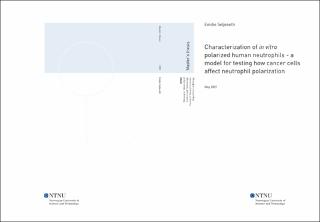| dc.contributor.advisor | Nilsen, Nadra | |
| dc.contributor.advisor | Bugge, Marit | |
| dc.contributor.author | Seljeseth, Emilie | |
| dc.date.accessioned | 2021-09-25T16:03:41Z | |
| dc.date.available | 2021-09-25T16:03:41Z | |
| dc.date.issued | 2021 | |
| dc.identifier | no.ntnu:inspera:79416900:51317253 | |
| dc.identifier.uri | https://hdl.handle.net/11250/2782495 | |
| dc.description.abstract | Nøytrofile er de mest tallrike leukocyttene i den menneskelige sirkulasjonen og de første cellene som rekrutteres til infeksjons- og betennelsessteder. Disse medfødte immuncellene er hovedaktører i vertsimmuniteten og har tradisjonelt blitt ansett som en homogen populasjon av celler, hvis hovedformål er å beskytte mot infeksjoner. Imidlertid har økende bevis avslørt en større heterogenitet for disse cellene enn først antatt, og observasjonen om at nøytrofile spiller viktige roller i patogenesen av forskjellige sykdommer har utløst en fornyet interesse for nøytrofilbiologi. Kreft er en sykdom der antall nøytrofile i sirkulasjonen øker, noe som ofte korrelerer med dårlig prognose, og flere studier har rapportert en økning av nøytrofile i tumor mikromiljøet. Videre har nøytrofile blitt observert i å bli polariserte i tumor mikromiljøet og kan tilegne seg både anti- (N1) og pro-tumor (N2) fenotyper, noe som kan åpne muligheten for målrettede terapier.
Fordi nøytrofile har kort levetid i kultur og er sensitiv for spontan aktivering og apoptose, har de fleste studier på nøytrofile i kreft vært basert på musemodeller. Likevel, fordi det er biologiske forskjeller mellom nøytrofile i mus og mennesker kan ikke resultatene som observeres i tumor-systemer basert på mus direkte overføres til mennesker. I denne studien ble en nylig rapportert metode for in vitro polarisering av humane nøytrofile til celler med N1- og N2-lignende egenskaper vurdert og verifisert. I tillegg ble N1- og N2-polariserte celler karakterisert ytterligere og demonstrert til å utvise distinkt genuttrykk. Til slutt ble in vitro polariseringsmodellen benyttet til å undersøke polariseringspotensialet til tykktarmskreftceller. De foreløpige funnene avslørte at TLR3-aktivering i tykktarmskreftceller muligens forskyver polarisering mot en N1-fenotype og demonstrerte at denne modellen kan brukes til å undersøke hvordan inflammatoriske signalveier virker inn på polarisering av nøytrofile. | |
| dc.description.abstract | Neutrophils are the most abundant leukocytes in the human circulation and the first cells to be recruited to sites of infection and inflammation. These innate immune cells are major players in host immunity and have traditionally been considered a homogenous population of cells, whose main purpose is to protect against infections. However, accumulating evidence has revealed a larger heterogeneity for these cells than first presumed and the observation that neutrophils play important roles in the pathogenesis of various diseases has sparked a renewed interest in neutrophil biology. Cancer is a condition in which the number of neutrophils in circulation increases, often correlating with poor prognosis, and several studies report an enrichment of neutrophils in the tumor microenvironment (TME). Further, neutrophils have been observed to become polarized in the TME and can acquire both anti- (N1) and pro-tumor (N2) phenotypes, which may offer possibility for therapeutic targeting.
Because neutrophils have short lifespans in culture and are prone to spontaneous activation and apoptosis, most studies on neutrophils in cancer have been based on murine models. However, because there are biological differences between human and murine neutrophils, the results observed in murine tumor systems may not translate to humans. In this study, a newly reported method for in vitro polarization of human neutrophils into cells with N1- and N2-like characteristics was assessed and verified. In addition, the N1- and N2-polarized cells were characterized further and were revealed to exhibit distinct expressional profiles. Finally, the in vitro polarization model was further employed to investigate the polarization potential of colon cancer cells. The preliminary findings indicated that TLR3-activation in colon cancer cells shifts polarization towards an N1-like phenotype and demonstrated a use for this model in the elucidation of how inflammatory signaling affect neutrophil polarization. | |
| dc.language | eng | |
| dc.publisher | NTNU | |
| dc.title | Characterization of in vitro polarized human neutrophils - a model for testing how cancer cells affect neutrophil polarization | |
| dc.type | Master thesis | |
